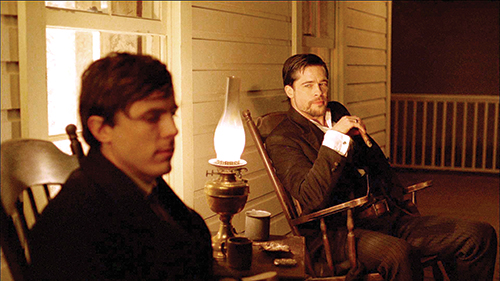
When I was a kid, my dad practically forced me to watch Lonesome Dove.
I was convinced that a 10-hour miniseries about two old men on horses would be slow torture, but it actually inspired my lifelong love of the Western. I have a lot of arguments with other film fans about this.
It is a peculiar kind of genre, both remarkably easy and uniquely difficult to define. Not everybody can see the appeal of these stories, but why else have they been so popular for so long?
Andrew Dominik’s 2007 film The Assassination of Jesse James by the Coward Robert Ford is a modern revisionist Western that chronicles the last days of one of the West’s most famous outlaws, played by Brad Pitt.
If you’re not familiar with the term, revisionist Westerns are exactly what you’d imagine they are—attempts to deconstruct the archetypes of pre-World War II Western films and novels.
In revisionist Westerns, the cowboys aren’t always heroes and the Native Americans aren’t always savages. Women can be more than either schoolmarms or prostitutes.
Stories are told with cynical realism instead of misplaced romanticism.
Ironically, the 1949 film I Shot Jesse James is widely regarded as the first revisionist Western. The further in time we get from the Old West, the more our fascination with this period shifts and changes.
Dominik’s unique outlook feels both incredibly modern and meticulously authentic, and there are a lot of good things to say about it.
Pitt’s James is in his 30s, living in Missouri with his wife and children in the twilight of his outlaw career. While planning a train robbery with what’s left of his gang, he meets Robert Ford, a squirrelly, 19-year-old sycophant, masterfully played by Casey Affleck.
Ford’s older brother Charley (Sam Rockwell) is already part of the gang, and the younger Ford brother idolizes Jesse James from the period’s dime novels, which told romantic versions of his adventures. But the real-life outlaws don’t see Bob Ford as gunslinger material.
The celebrity of Jesse James is a central theme of the story, though I think drawing parallels between the outlaw’s fame and the modern glorification of infamy is kind of a cheap way to look at it.
Of course, Jesse tells Bob early on that the novels he’s read since he was a little boy are all lies. But is America glorifying evil? Or is the truth more complex?
Pitt’s incredible, slow-burning performance paints Jesse James as a complicated figure—sinister and violent, pragmatic and fiercely intelligent, charismatic and good-humored.
The film never shies away from the stark reality that James has committed ugly deeds and is now immersed in a paranoid downward spiral. Yet, by the end of the film, you’re drawn to the idea that Jesse James was an admirable figure.
Affleck is also excellent. As Bob Ford, a so-called nobody who is routinely mocked by his older brother for his childlike devotion to James, he seems torn between idolizing his hero and resenting the fact that he idolizes him.
Jesse, to his great credit, understands this perfectly: “Do you want to be like me, or do you want to be me?” he asks Bob.
Whether you know anything about the history, the verbose, descriptive title lets you know how this story is going to end.
I was vaguely expecting Bob’s betrayal of Jesse James to be painted as something heroic—ironically, not cowardly at all—and that the moral of the film would be society’s worship of the wrong man. I was pleasantly
surprised to be so pleasantly surprised.
The Assassination of Jesse James is steeped in reality, from Roger Deakins’ stunning cinematography to the authentic dialogue of Dominik’s script. It seems to question why exactly Jesse James has become a legend, with festivals and historic sites devoted to him to this day.
The Assassination of Jesse James by
the Coward Robert Ford
510 SW Hall St.
Friday–Saturday, April 5–6, 7 p.m. and 10 p.m.
Sunday, April 7, 3 p.m.
$3 general admission, PSU students free
In one of the film’s best scenes, Bob tells Jesse over the dinner table about how he used to keep a list of all the similarities between them, like height and eye color.
Yet Bob’s acute lack of the undefinable specialness that made Jesse so legendary is his downfall. He will never be Jesse James. But should he really want to be?
I always struggle to explain to people why they should love Westerns. The fact that filmmakers can’t get enough of this period in American history is fascinating to me.
There’s a lawlessness to these stories that draws people in: The bad guys are not always bad, and the good guys are not always good. I think what I love about this genre is the gray moral area in which it operates; Westerns have a way of painting the wholeness of the human experience.
While there is a lot to admire about this movie, sometimes the directing gets in the way of everything else. At two hours and 40 minutes, it’s entirely too long and meanders too often.
The bloated running time—combined with the excessive voiceovers—often make the film feel pretentious, especially at the end, where Affleck’s performance is truncated by the need to rush through things with narration.
There is not much action in The Assassination of Jesse James by the Coward Robert Ford. It’s a slow-moving character study, unique among Westerns of its time.
And yet the film’s themes and questions speak to the nature of the genre itself.
The modern Western can be about redefining good and evil, and there’s no better time to do that then when the sun sets on America’s most infamous outlaw.

